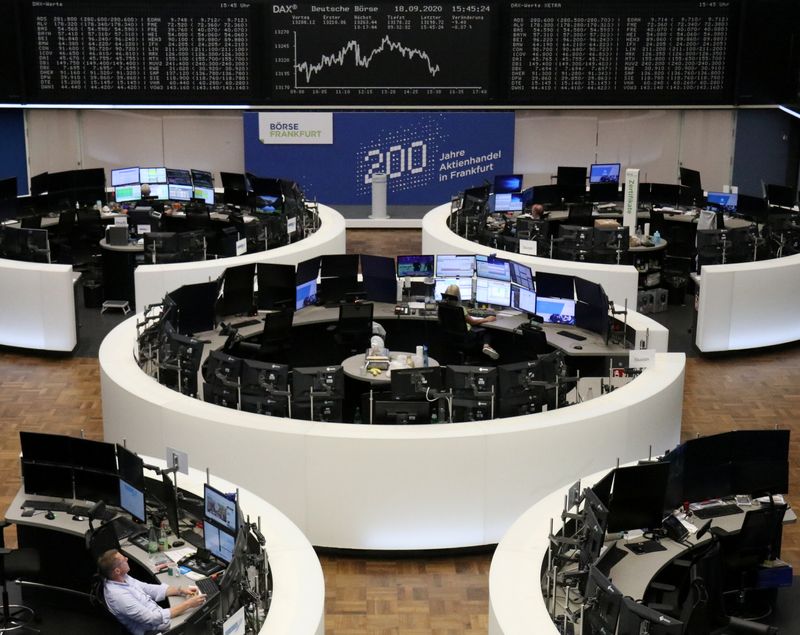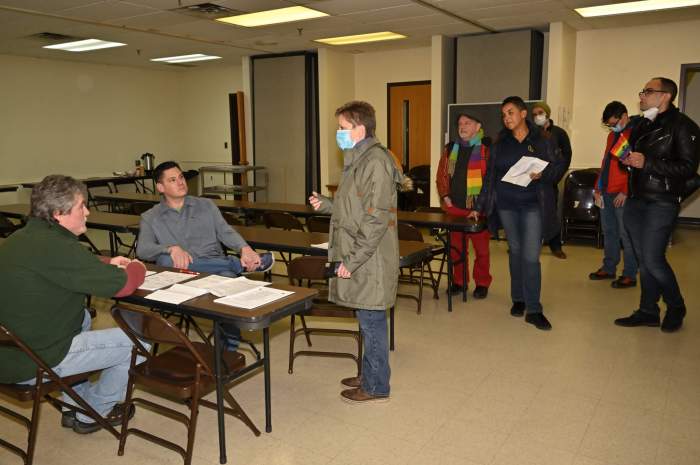NEW YORK (Reuters) – Stocks fell 2% around the globe this week and the dollar posted its strongest weekly performance since April as concern over the economic effect of a second wave of coronavirus-related lockdowns weighed on investors’ risk appetite.
But tech stocks led the way higher on Wall Street on Friday, as they have of late on days governed by worries over the economic recovery. The gains more than offset losses in Europe and an index of major stock markets globally rose 1% on the day.
Other than COVID-19 angst, the week was dominated by speculation over the likelihood of another stimulus package to support the American economy.
“There’s evidence of a slowdown in the United States, which we think is temporary, but it would be reinforced if there is no additional fiscal package,” said Sebastien Galy, senior macro strategist at Nordea Asset Management.
On Wall Street, the Dow Jones Industrial Average rose 358.52 points, or 1.34%, to 27,173.96, the S&P 500 gained 51.87 points, or 1.60%, to 3,298.46 and the Nasdaq Composite added 241.30 points, or 2.26%, to 10,913.56.
The S&P posted four consecutive weekly losses, the longest such streak in over a year. It is down nearly 6% in September.
The pan-European STOXX 600 index lost 0.10% and MSCI’s gauge of stocks across the globe gained 1.03%. Despite Friday’s strong gains, the global index fell 2% for the week.
Emerging market stocks rose 0.13%. MSCI’s broadest index of Asia-Pacific shares outside Japan closed 0.51% higher, while Japan’s Nikkei rose 0.51% to end a three-day week.
Treasuries remained little changed in a week where the 10-year yield traded in a 5-basis-point range.
“Overall the market remains fairly range-bound. There is some intraday, intra-week volatility that when you really look at it, we just don’t go anywhere,” said Justin Lederer, an interest rate strategist at Cantor Fitzgerald.
Benchmark 10-year notes last rose 3/32 in price to yield 0.6561%, from 0.664% late on Thursday.
But the relapse in sentiment has hit emerging market debt, especially countries with weak credit ratings. Argentina’s newly restructured bonds have lost around 25% in under a month, making it the worst return to markets since Greece in 2012, while plenty of other countries have seen 10% slides.
China’s government bonds gained acceptance into one of the world’s most coveted bond benchmarks, the FTSE Russell WGBI. CGBs will be introduced late next year.
(For graphic on MSCI World over the years: https://fingfx.thomsonreuters.com/gfx/mkt/jbyprmxoxve/Pasted%20image%201601012917530.png)
In currency markets, the dollar index climbed for the fourth time this week and set its strongest weekly showing since April.
The dollar index rose 0.315% on Friday, with the euro down 0.39% to $1.1626.
The Japanese yen weakened 0.16% versus the greenback at 105.59 per dollar, while sterling was last trading at $1.2741, down 0.06% on the day.
JB Mackenzie, managing director of futures and forex at TD Ameritrade, sees increasing volatility ahead of the Nov. 3 U.S. election and as a result, more demand for the dollar.
“The election and stimulus and the continued economic recovery, those three parts, if those are not working lock step, there very well could be a movement to the dollar as that flight to safety trade,” said Mackenzie.
The Russian rouble sank 1.2% to a near six-month low of 78.23 to the U.S. dollar. Geopolitical concerns further weighed on Russian assets with the threat of sanctions over the poisoning of Kremlin critic Alexei Navalny, in which Moscow denies wrongdoing. The crisis in neighboring Belarus also continued to linger.
The dollar’s strength this week has also battered commodities, with gold on track for its biggest weekly drop in at least six. On Friday, spot gold dropped 0.4% to $1,861.46 an ounce.
Silver tumbled 14% this week, a drop not seen in over six months. The spot price fell 1.33% to $22.90 on the day.
Oil prices fell for the day and week mostly due to mounting worries about the impact on fuel demand of a widespread resurgence in coronavirus infections.
U.S. crude recently fell 0.5% to $40.11 per barrel and Brent was at $41.86, down 0.19% on the day.
(For graphic on EM FX feels the pain: https://fingfx.thomsonreuters.com/gfx/mkt/dgkplbjlopb/Pasted%20image%201601036609079.png)
(Reporting by Rodrigo Campos; additional reporting by Marc Jones and Noah Browning in London, Laila Kearney, Sinéad Carew and Chuck Mikolajczak in New York and Devik Jain in Bengaluru; Editing by Chris Reese, Steve Orlofsky and Tom Brown)

























